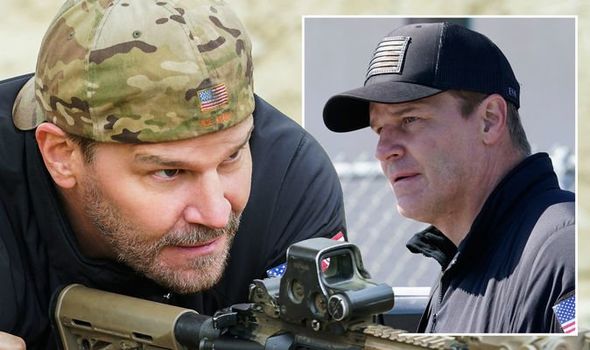
Why Clay’s SEAL Team Death Was Necessary, According to David Boreanaz
The death of Clay Spenser, portrayed by Max Thieriot in SEAL Team, was a shocking and heart-wrenching moment for fans of the series. His character, a beloved member of Bravo Team, had been through a tremendous amount of personal growth and emotional turmoil, making his ultimate fate all the more devastating. However, despite the emotional toll his death took on both the characters and the audience, David Boreanaz, who plays Jason Hayes, believes that Clay’s death was an essential part of the story’s evolution.
In this article, we’ll explore why David Boreanaz feels that Clay’s death was necessary for the narrative of SEAL Team, how it contributes to the show’s realism, and what it means for the future of Bravo Team.
1. The Realities of Military Life and Sacrifice
The Harsh Truth About Warfare
For David Boreanaz, Clay Spenser’s death was a natural reflection of the real-life stakes involved in military operations. SEAL Team has always prided itself on being a realistic portrayal of the lives of Navy SEALs, and the brutal reality of warfare is a constant theme throughout the show. The death of Clay, a character who had shown so much potential and development, drives home the unpredictable and dangerous nature of the job.

Boreanaz explained that the decision to kill off Clay was rooted in the need to stay true to the real-life experiences of soldiers who serve in elite military units. “The show has always been about the cost of war, and sometimes that cost is losing those who are closest to you,” Boreanaz said. “Clay’s death, while painful, was necessary to reflect the harsh realities of the military and to give the show a sense of authenticity.”
Why This Was a Necessary Choice for the Story
- Military missions often come with unexpected, irreversible consequences.
- The unpredictability of warfare is central to the message of SEAL Team.
- Clay’s death was a way to highlight the emotional toll on the remaining characters, especially Jason Hayes.
2. Emotional Growth for the Characters
The Ripple Effect on Bravo Team
One of the most profound impacts of Clay’s death was how it affected the remaining members of Bravo Team. Jason Hayes, in particular, was deeply shaken by the loss of his comrade. Throughout the series, Jason and Clay shared a brotherly bond, with Jason serving as a mentor and protector to the younger, more impulsive Clay. Losing him forced Jason to confront his own vulnerabilities and reflect on the sacrifices inherent in his role as a leader.
Boreanaz stated that Clay’s death provided the opportunity for his character, Jason, to experience growth. “The death of a team member, especially someone like Clay, forces Jason to re-evaluate his role and responsibilities. It forces him to deal with grief in a way that he hasn’t had to before,” Boreanaz said.
The death also allowed other members of Bravo Team to grow and evolve in their roles. Each character had to grapple with their own feelings of guilt, loss, and the consequences of their profession.
Why This Was a Necessary Choice for the Story
- It prompted emotional growth for key characters, particularly Jason.
- It deepened the relationships within Bravo Team, showcasing how personal loss can impact professional bonds.
- The grief felt by the team added complexity and depth to the series.
3. Raising the Stakes: A Turning Point in the Story
Shifting the Show’s Tone and Narrative Direction
Boreanaz also sees Clay’s death as a turning point for SEAL Team in terms of narrative and emotional depth. The show, which had always portrayed the physical and mental toll of military life, now had to deal with the aftermath of a significant loss. This shift not only raised the stakes for the remaining characters but also created new challenges for the team to overcome, both as a unit and as individuals.
“The moment Clay dies, everything changes for Bravo Team,” Boreanaz explained. “It’s no longer just about the next mission. It’s about how they move forward without one of their own. It’s a huge emotional shift, and it changes the direction of the show in a very powerful way.”
This pivotal moment allowed the series to explore themes of grief, sacrifice, and the emotional cost of serving in an elite military unit. It also introduced a new dynamic for the team, as they now had to face the difficult reality of moving forward without one of their strongest members.
Why This Was a Necessary Choice for the Story
- It raised the stakes of the series, making the missions feel even more perilous.
- It forced the characters to deal with the emotional aftermath of their actions.
- The loss created new opportunities for storytelling, shifting the narrative in an impactful way.
4. Honoring the Real Heroes Behind the Characters
Reflecting the Sacrifices of Real-Life Soldiers
Another reason why Clay’s death was deemed necessary by Boreanaz was because it served as a tribute to the real men and women who make similar sacrifices in the military every day. The show, which has always strived to be realistic and respectful of military life, wanted to honor the reality of what soldiers go through when they lose comrades in the field.
“There are real soldiers who face this kind of loss in the field,” Boreanaz said. “Clay’s death wasn’t just for the story, it was a way to honor the sacrifices made by real men and women in uniform. It’s important to show that the consequences of war are not just about the missions but the emotional toll it takes on the individuals who live through it.”
By killing off a major character like Clay, SEAL Team was able to remind viewers of the ultimate sacrifices made by those in the armed forces, reinforcing the sense of respect and admiration that the show has always aimed to inspire.
Why This Was a Necessary Choice for the Story
- It served as a tribute to real-life military sacrifices.
- The loss was a reminder of the emotional and physical costs of military service.
- It provided a realistic portrayal of the dangers and consequences faced by soldiers in combat.
5. The Impact on the Show’s Future
How Clay’s Death Will Influence the Show Moving Forward
With Clay’s death, SEAL Team enters a new chapter that will undoubtedly shape the future of the series. The team now has to adapt without one of their most capable and emotionally-driven members, and this change will likely influence the direction of upcoming seasons.
David Boreanaz has hinted that Jason Hayes, as the team leader, will face even more pressure as he deals with the loss of Clay and how it impacts the team dynamics. “Jason has always carried the burden of leadership, but now he has to lead with a heavy heart,” Boreanaz explained. “It will affect his decisions and his interactions with the rest of Bravo Team. We’re going to explore the idea of leadership under extreme emotional strain.”
With the loss of Clay, Bravo Team faces new challenges that will test their resilience and push the boundaries of what they can endure together. It’s clear that Clay’s death won’t just affect the characters emotionally; it will also create new tensions, alliances, and conflicts within the team moving forward.
Why This Was a Necessary Choice for the Story
- It sets the stage for future conflicts and developments in the storyline.
- The loss will affect the leadership dynamic and relationships within Bravo Team.
- It opens up opportunities to explore new emotional and narrative arcs for the remaining characters.
Conclusion: The Necessary Loss of Clay Spenser
David Boreanaz’s perspective on Clay’s death reveals that it was not only a key narrative moment for SEAL Team but also an essential one for the show’s authenticity and emotional impact. By killing off Clay Spenser, the show mirrored the harsh realities of military life, raised the stakes for Bravo Team, and offered the remaining characters an opportunity for growth and transformation.
While his death was undoubtedly a painful and shocking moment, it was one that contributed to the realism, emotional depth, and storytelling excellence that SEAL Team is known for. As the show moves forward, the loss of Clay will continue to resonate with the team, the audience, and the characters who now must face a world without him.
In the end, Clay’s death was not just a plot point — it was a necessary part of the larger story SEAL Team had been building toward. And as Boreanaz explained, it was a tribute to the real sacrifices made by soldiers every day, underscoring the show’s commitment to honoring their experiences and sacrifices.